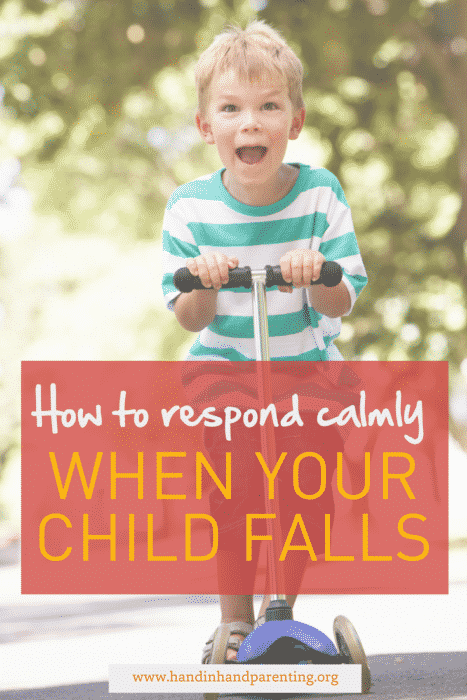How can you respond to a hurt child calmly, when you feel panicked yourself? Instructor Emilie Leeks discovers it takes some practice, but the results are easy to see.
“We'd only just left for the shops when our 3-year-old slipped off their scooter. It was quite a tumble, and they were clutching at their legs and sobbing. I sat next to them on the pavement, pulling them gently into my lap and leaning around so they could look into my eyes if they chose to, and then just held them. I watched as tears rolled down their distraught face.
I hate it when my children are hurt. What I wouldn't give to wrap them in cotton wool so they don't have to feel pain in their lives! But I can't – and, more importantly, I mustn't. They need to experience these small knocks which life throws at them – physical hurts, disappointments, frustrations, fears – in order to learn emotional resilience.
If they don't experience setbacks, they can't learn that they will get through it. And anyway, I can't protect them, either from everything or forever.
Respond to a hurt child with confidence rather than concern

And I too am learning. I am learning how best to help them with their pain. I am learning not to rush – I'm there just as soon as I can be, but they need to be reassured by my presence, not panicked by it.
I am learning not to respond to a hurt child with deep concern in my face. They need to see my confidence that they will get through this. I am learning to use empathy, not pity, in my voice, so they can rest in the realisation that I understand, but that I am not worried.
The message I try to give is that they are not ok right now, but that they will be. These hurts are very rarely an emergency.
So I listen – I try to enjoy listening even – through the tears, safe in the knowledge that this is just what my child needs right now. Their siblings both come over to check that they’re ok and my heart swells a little.
A few minutes pass, and the tears start to ease. And through the tail end of their pain and fear they say: ‘I’m not going to do that again when I’m going fast.’
They stop crying, jump on their scooter, and all of a sudden we're off.
Crying paves the way for new confidence
My sweet child races on ahead as we make our way to the shop. After buying the few bits we need they have just the best time, scooting up and down, up and down, up and down the ramp outside the shop.
I see speed and joy and agility and confidence as my child races down and around corners – skill that I haven't seen in them before.
Not so long ago, we would have been turning back to the house after that fall. There’s no way they’d be able to scoot all the way to the shops now after that fall. I underestimated my child then. Even with two grazed knees, and a sizeable scrape across their ankle, all they needed was someone to hold space for those big feelings. Someone to hear the expression of shock and pain from their tumble.
After that they were done.
Ready to move on with their day without a backward glance.
This way of responding when my children are hurt feels supportive, natural, and confidence-boosting.
Try this way of responding calmly when your child is hurt
- Take a breath and assess the pain level and injury. Are you safe to remain in this spot?
- Make space. Come close, be available for eye contact and physical contact if that's what your child needs.
- If your child looks at you, return the gaze with confidence. Hold onto the idea that they are not ok right now, but they will be.
- Listen. The space you give your child now helps them recover well.
- Wait until your child's tears ease and see how they want to move on. Many times after a good cry, they'll be ready to get back up and start again. If they are not, that's OK too. Offer your hand and suggest going slowly for a while.
